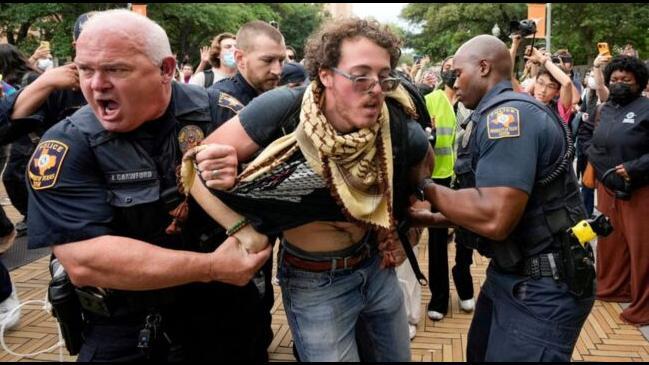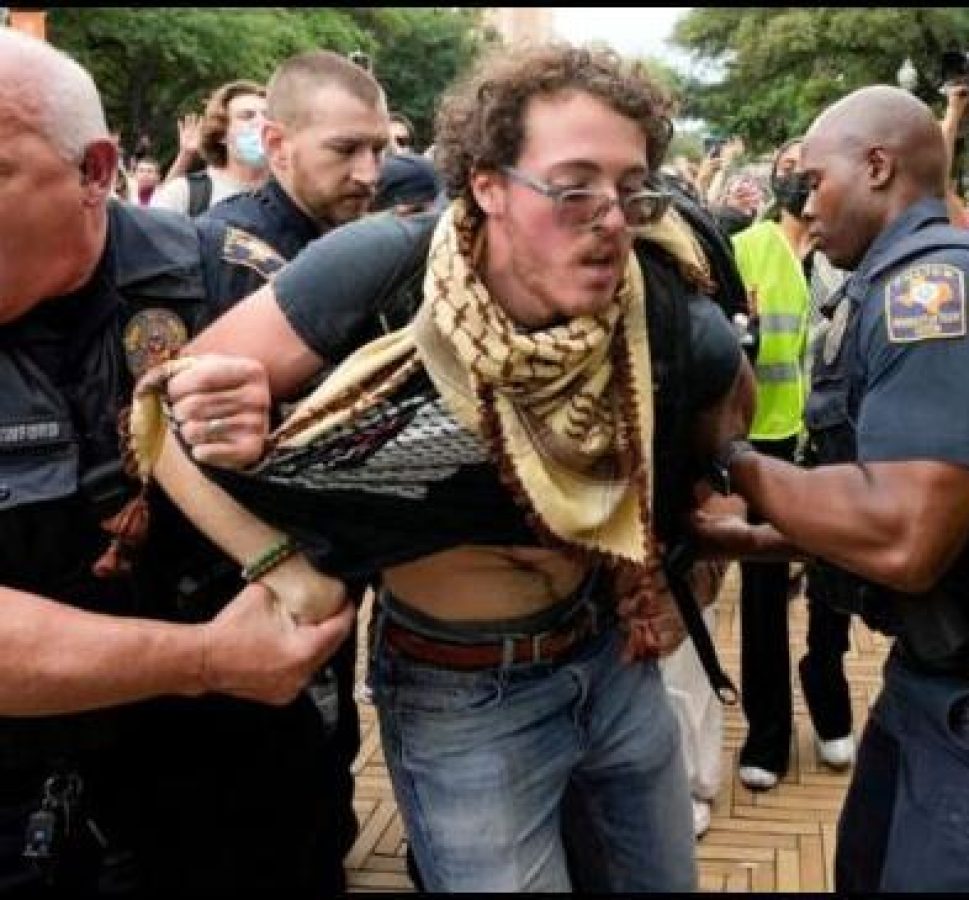
Police crack down on demonstrations at UT Austin and USC as students at Harvard and Brown set up encampments in protest against Israel’s war on Gaza.
Police in the United States have arrested dozens of protesters at the University of Texas at Austin (UT Austin) and the University of Southern California (USC) as student-led demonstrations against Israel’s war on Gaza intensified across the country and House Speaker Mike Johnson suggested calling in the National Guard.
The arrests on Wednesday in cities of Austin and Los Angeles came as students at Harvard University and Brown University on the east coast also defied threats of action and set up encampments in solidarity with Palestinians in Gaza.
The movement, which began at Columbia University in New York last week, is calling on universities to cut financial ties to Israel and divest from companies they say are enabling its brutal war in Gaza. At least 34,262 Palestinians have been killed in Israeli attacks on the besieged enclave since October 7, when fighters from Hamas attacked southern Israel, killing 1,139 people and taking dozens of people captive.
The student-led protests have been peaceful and largely respectful, but have been met by heavy-handed action from many universities amid allegations of anti-Semitism.
The biggest rally on Wednesday took place at UT Austin where hundreds of students staged a walkout and marched to the campus’s main lawn, where they planned to set up an encampment. But the university said it would “not tolerate disruptions” and called in local and state police to disperse the crowds.
Hundreds of officers arrived at the scene, some on horseback. Holding batons, they charged at the crowds and forcefully arrested several students.
At least 34 were taken into custody, the Texas Department of Public Safety said.
Greg Abbott, the Republican governor of Texas, said the protesters “belong in jail” and that any students joining in what he called “hate-filled, anti-Semitic protests” should be expelled.
Jeremi Suri, who is Jewish and a professor of history at UT Austin, told Al Jazeera there was “nothing anti-Semitic” about the protests.
“These students were shouting ‘free Palestine’, that’s all,” he said. “They were saying nothing that was threatening. And as they were standing and shouting, I witnessed the police – the state police, the campus police, the city police – an army of police almost the size as the student group … many were carrying guns, many were carrying rifles, and then, within a few minutes, this group of police stormed into the student crowd and started arresting students.”
At the USC campus in Los Angeles, efforts by students to set up an encampment were also met with force.
Campus security scuffled with students as they took down tents, and dozens of police officers holding batons and wearing helmets later moved in to arrest the protesters as helicopters hovered overhead. The crackdown came after USC Provost Andrew Guzman sent a campus-wide email, saying protesters had “threatened the safety of our offices and campus community”.
Al Jazeera’s Rob Reynolds, reporting from the university, however, said that “this protest against the war on Gaza was entirely peaceful”.
“We did not see any confrontations or harassment among the students,” he said.
Reynolds said some of the students later staged a sit-in with their arms linked.
“One by one, protesting students are being handcuffed with zip ties and led away by Los Angeles police officers, under arrest and taken away to a vehicle on the campus. They did not resist arrest and we did not see any violence on the part of the police,” he added.
The Los Angeles Police Department said some 93 people were arrested in and around the USC campus.
Jody Armour, a law professor at the university, said officials were using claims of anti-Semitism to try and silence the protests.
“We have lots of Jewish, and Muslim, and Palestinian, and Catholic like I am, Protestants too, intergenerational, coming together. Everybody should hate anti-Semitism and fight anti-Semitism, but being opposed to Israel’s slaughter in Gaza that the UN has said may plausibly be genocide, does not mean that you’re anti-Semitic, and we need to stop allowing people to weaponise anti-Semitism against real valid protests.”
On the other side of the country, in Cambridge, Massachusetts, hundreds of students at Harvard University set up their own encampment at Harvard Yard, despite the university closing the space and threatening “disciplinary action” against students for setting up tents without prior permission. The protesting students were calling for the institution to divest from Israel and also lift the suspension of a pro-Palestine group called the Harvard Undergraduate Palestine Solidarity Committee.
Similar scenes played out at Brown University in Providence, Rhode Island.
The New York Times said students there had erected some 40 tents by Wednesday afternoon, despite the university threatening “proceedings” against the students if they did not clear out.
At Columbia University in New York, meanwhile, there was an uneasy truce between students and officials.
The university, which called in police to clear an encampment last week resulting in the arrest of more than 100 students, is currently in talks with the students to dismantle the protest camp and averted another confrontation by extending a deadline for dispersal by another 48 hours.
Johnson, the Republican speaker of the US House, also visited the campus to support Jewish students amid concerns of anti-Semitism, and called on Columbia President Nemat Shafik to resign “if she cannot bring order to this chaos”. Johnson, who addressed the media on the library steps near the encampment, said that “if this is not contained quickly and if these threats and intimidation are not stopped, there is an appropriate time for the National Guard”.
He said he intended to demand US President Joe Biden “take action”, and warned that the demonstrations “place a target on the backs of Jewish students in the United States”.
Protesters nearby appeared to pay little attention.
“We regret that there’s no attention on this peaceful movement and politicians are diverting attention from the real issues,” said Mahmoud Khalil, a Palestinian student at Columbia who was part of the negotiations with the university’s administration about the protests although he was not staying at the camp. “This is academic freedom, this is freedom of speech.”
White House spokeswoman Karine Jean-Pierre, meanwhile, said Biden backed free speech.
“The president believes that free speech, debate and nondiscrimination on college campuses are important,” she told reporters.






